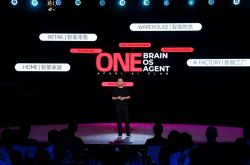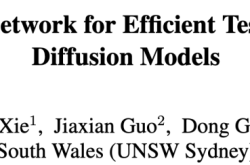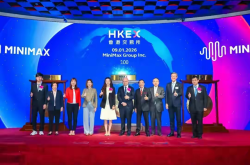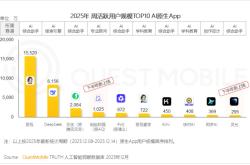Challenging BBA: Domestic Auto Brands Must First Confront the Hidden Giant, Lexus!
![]() 01/09 2025
01/09 2025
![]() 473
473
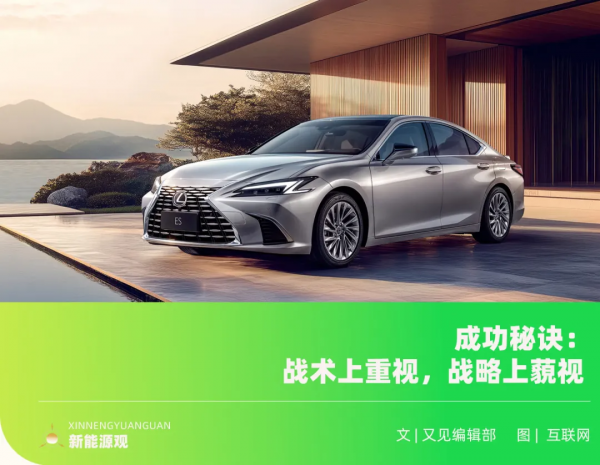
Xinnengyuanqianzhan (ID: xinnengyuanqianzhan) Original
3,266 words in full, 9-minute read
In the fiercely competitive luxury car market, domestic consumers' choices have become increasingly diverse. The BBA trio—Mercedes-Benz, BMW, and Audi—has long dominated the hearts of Chinese consumers, neither out of reach for super luxury brands nor surpassed in love by ordinary car brands.
Due to BBA's strong presence in China, many domestic brands perceive them as imaginary adversaries. Industry leaders often talk about defeating BBA and set flags for domestic brands to hold their heads high.
However, defeating BBA is not something that can be achieved overnight. When domestic car manufacturers set their sights on defeating BBA, they encounter a "hidden giant" in front of them. This low-key yet powerful competitor not only has a solid user base in the Chinese market but also demonstrates unyielding resilience amidst the domestic new energy wave.
It is Lexus.
To defeat BBA, domestic cars must first surmount this unavoidable obstacle.
1. Are Luxury Brands Falling Apart?
The Hidden Giant Making Quiet Profits
China's automobile consumer market in 2024 witnessed fierce competition among luxury car brands, particularly driven by new energy vehicles, resulting in significant changes in the market landscape.
While traditional luxury cars, especially the BBA trio, still dominate, Chinese independent brands and new forces are rapidly rising and posing a strong challenge to traditional luxury brands.
Recently, news of a female car owner in Hefei, Anhui, hanging banners for rights protection on the burnt remains of a Lexus attracted online attention, prompting people to re-examine the Lexus brand.
The burnt car was a hybrid Lexus UX 260H, purchased in May last year with only 15,000 kilometers on the odometer. Surveillance footage of the fire accident showed that on October 19 this year, the car smoked while driving to an intersection. After the fire was extinguished, the entire car was burned to a shell. Subsequently, the female car owner hung a rights protection banner on the vehicle remains and went to the 4S store where she bought the car to demand an explanation, claiming that the 4S store ignored the fire incident.

Image/Car Owner Rights Protection
Source/Screenshot from Sohu Video and Xinnengyuanqianzhan
The incident of the female car owner making a scene at the Lexus 4S store once attracted widespread attention. This incident not only revealed issues in customer service but also reflected the true face of Lexus in the Chinese market.
If BBA is the big giant, then Lexus is the small giant or the hidden giant. Many people think that Lexus, like some imported luxury brands, has been defeated by the fierce impact of domestic new energy, but it's not what you think. In fact, Lexus still maintains a strong sales momentum in China.
The latest sales data released by the China Passenger Car Association shows that from January to November 2024, Lexus sold 164,000 vehicles in China, accounting for 24.8% of the market share of imported luxury cars during the same period, ranking first and being the only brand to achieve year-on-year growth, with an increase of 4%.
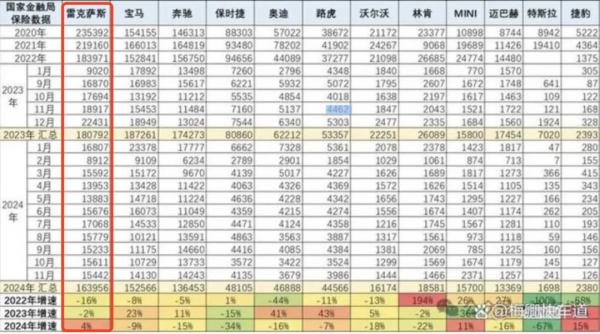
Image/Lexus sales from January to November 2024
Source/Screenshot from the Internet and Xinnengyuanqianzhan
In contrast, sales of other major imported luxury brands during the same period declined to varying degrees, such as Volvo, which fell by 7% year-on-year, and Jaguar Land Rover, which declined by 15%. Looking at BBA, from the sales figures in the first three quarters of 2024, Mercedes-Benz sold 512,200 vehicles in the domestic market, a year-on-year decline of 10.2%; BMW sold 524,000 vehicles, a year-on-year decline of 13.1%; and Audi sold 470,000 vehicles, a year-on-year decline of 8.5%.
At the same time, more and more BBA stores are closing or planning to close in the Chinese market: BMW's first global 5S store, Beijing Xingdebao Automobile Sales Service Co., Ltd., announced its closure; Tianjin's largest Audi 4S store, Yonghao Audi, closed; and Xi'an's largest Mercedes-Benz 4S store was taken over by NIO Automobile. This series of actions marks a wave of "recession" for luxury brands in the Chinese market.
There is no harm without comparison. It seems that Lexus is indeed a hidden giant in front of domestic brands, rising against the trend and quietly making a fortune.
From the perspective of mass consumers, Lexus's rise against the trend is recognition of its product reliability and service quality. Li Weien (pseudonym), a Lexus owner in Shanghai, shared on social media: "Although I've heard some negative news, which brand doesn't have negatives? The quality of Lexus is still reliable, and the tone of a luxury brand can also hold up in the scene."
2. No One is a Pushover
Domestic Cars Shouldn't Dream of Success Overnight
Globally, the scale of the luxury car market is increasing year by year. Data shows that from 2024 to 2028, the average annual growth rate of luxury car brands will be between 5% and 6%. In China, the luxury car market is mainly concentrated in first, second, and third-tier cities, where car buyers with strong consumption power are concentrated, and the market scale is still considerable.
Therefore, many domestic brands have proposed challenging BBA in order to share a piece of the luxury car market. However, to truly defeat a formidable opponent like BBA is not easy. It might be better to "let go" of BBA first and focus on smaller giants like Lexus. Even when facing an opponent like Lexus, domestic brands cannot hope to easily win in a short period of time.
For most consumers, choosing a luxury brand often goes beyond the vehicle itself and includes the cultural value and personal identity behind the brand. Therefore, when trying to challenge traditional powerhouses like Lexus, domestic cars must not only provide excellent product performance but also establish a profound brand culture.
Take NIO Automobile as an example. Although it has achieved remarkable success in the field of new energy vehicles and its sales are comparable to those of Lexus, there is still a significant gap between the two in terms of brand influence and social recognition.
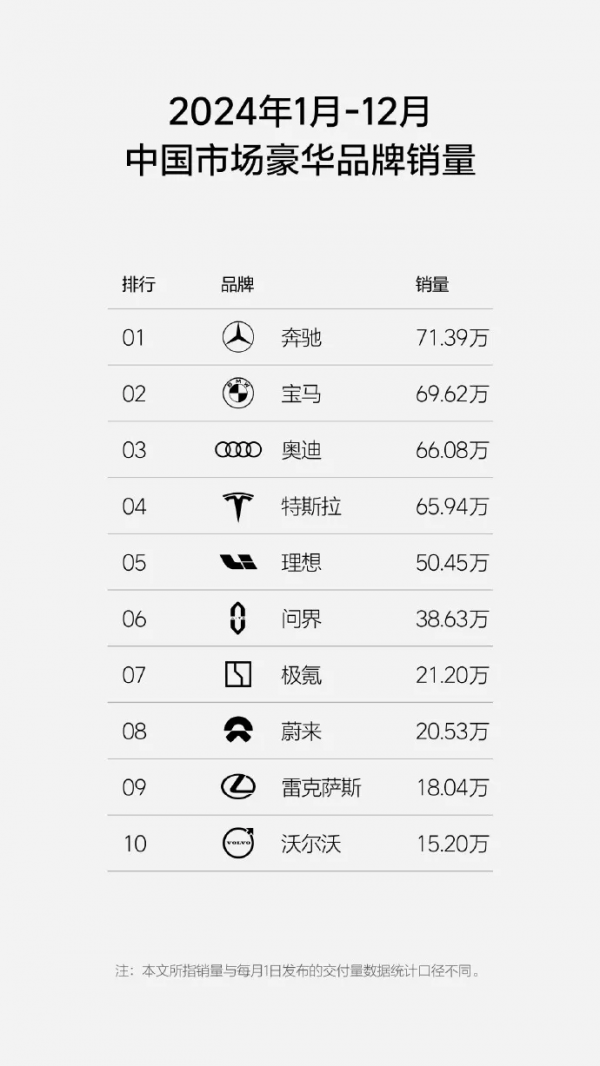
Image/Sales of some high-end brands from January to December 2024
Source/Screenshot from the Internet and Xinnengyuanqianzhan
New force brands like NIO are particularly important for attracting young consumers who pursue individuality. Xiao Zhao, a young white-collar worker in Chengdu, said: "I chose NIO not only because of its high configuration and good workmanship but also because it feels particularly prestigious to drive it, with a sense of supporting domestic products inside."
However, in the view of netizen "Stone", young brands like NIO, despite their strong momentum, are like "greenhorns" in front of established luxury cars like Lexus, "unable to hold their own and not in the same league." He said that if only the brand is considered without other factors, and a NIO and a Lexus are placed in front of us, most people may still choose Lexus.
This may be the diversity of social development, with some people liking domestic sentiment and others enjoying the satisfaction of luxury brands. Perhaps, given time for NIO and other brands to accumulate, Lexus may not be as appealing.
But no matter what, the rise of China's "NIOs" undoubtedly brings considerable pressure to "Lexuses," but the latter quickly adjusts its strategy with its own advantages and continues to maintain competitiveness. For example, at the 2024 Shanghai Auto Show, Lexus launched the all-new UX300e pure electric vehicle, which integrates the latest intelligent technology and eco-friendly design concepts and won a lot of attention upon its debut.
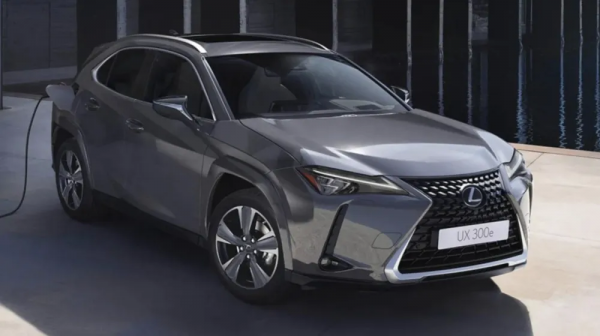
Image/Lexus UX300e
Source/Screenshot from the Internet and Xinnengyuanqianzhan
The reputation and customer loyalty accumulated by Lexus over the past few decades cannot be shaken overnight. No one is a pushover, and those who dream of success overnight will inevitably encounter setbacks. After the incident of the female car owner in Hefei, many consumers still have strong confidence in Lexus, which comes from the brand's consistent emphasis on quality and service commitment. This is precisely the shortcoming of our domestic brands and the lesson we need to learn the most.
3. The New Wave is Surging
The Old Wave Will Inevitably Be Defeated
Looking back at Lexus's path to success, we can see its high regard for the Chinese market in the globalization process. Whether in product design or after-sales service, Lexus strives to meet local market demand.
In terms of product design, the ES series is deeply loved by Chinese family users for its spacious and comfortable interior; the UX compact SUV meets the needs of the younger generation for stylish appearance and practical functions; and the LX series attracts many off-road enthusiasts with its powerful off-road capabilities and luxurious interior.
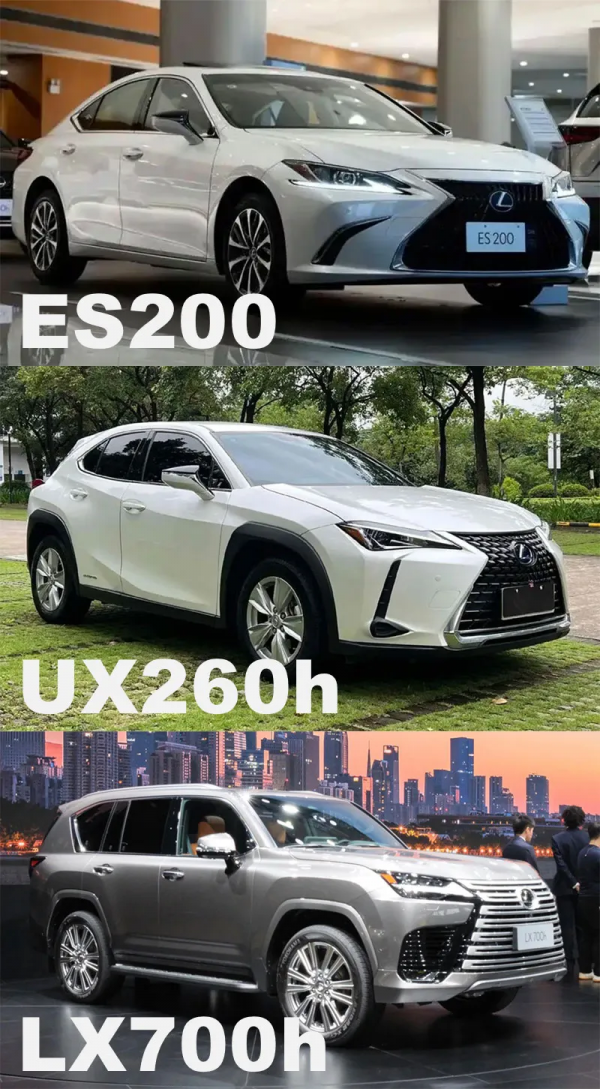
Image/Lexus ES, UX, LX models
Source/Screenshot from the Internet and Xinnengyuanqianzhan
In terms of product quality control, Lexus is meticulous and does not deceive consumers. According to the 2024 China Initial Quality Study report released by J.D. Power, Lexus has won the highest score for consecutive years, proving its leading position in product quality control.
At the same time, Lexus's continuous investment in hybrid technology has also won the brand a good reputation. It is also worth mentioning that the importance of corporate spirit and brand building cannot be ignored as they determine the long-term development of a brand. Domestic cars should recognize that establishing market trust is a long-term process that requires unremitting efforts to gradually win the favor of consumers. Traditional luxury brands like Lexus pursue brand reputation with great perseverance.
We should not lose confidence in ourselves. After discussing these advantages of Lexus, compared with domestic new force brand competitors, Lexus also faces challenges during the new energy transition period.
For example, XPeng focuses on the research and development of intelligent driving technology, attracting younger consumers with cost-effective smart electric vehicles; Li Auto solves the problem of range anxiety with its extended-range hybrid power solution, favored by long-distance travelers; NIO builds a strong user community by providing excellent user experiences and innovative service models, such as battery swapping networks and subscription services; Xiaomi Automobile relies on its strong intelligent technology ecosystem and brand influence to provide cost-effective and intelligent travel solutions, integrating smart homes and vehicles to create a seamless user experience...
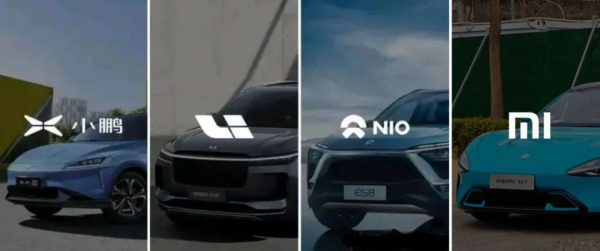
Image/Domestic self-owned brands
Source/Screenshot from the Internet and Xinnengyuanqianzhan
In contrast, although Lexus is also actively deploying in the new energy field, its actions in pure electric vehicles are slightly sluggish, becoming a bottleneck for future development. Secondly, modern consumers are increasingly paying attention to personalized and customized experiences, such as interior materials, body colors, power configurations, etc., allowing consumers to create unique vehicles according to their own needs. In this regard, our domestic brands undoubtedly do better.
As history has proven, changes in any industry are led by enterprises that dare to innovate and break through. In the future, it may be precisely because of these limitations of Lexus that our domestic brands will have opportunities to overtake and win.
The new energy wave is in the ascendant, and China, as one of the world's largest automobile markets, we can boldly predict that whether it is BBA or Lexus, they will ultimately lose to Made in China. It's just a matter of time. Focusing on the present, domestic brands might as well "let go" of BBA first and set their imaginary opponents a little lower, starting with Lexus!


